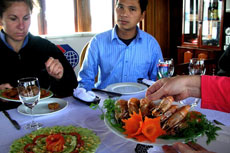Human Flower Project
Tuesday, October 16, 2007
Time for Bulbs & Identities
The students have come back to Cambridge with the task of identity-creation ahead. John Levett (who created his awhile back) opens his bulb order—too many—and searches for an open bench—too few.
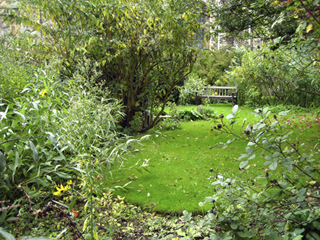
St. Botolph’s Churchyard, Cambridge, England
All Photos: John Levett
By John Levett
One April, twenty-three years ago I was avoiding someone’s fiftieth birthday party. I had great affection (do I hear “But not enough!” from the cheap seats?) for the birthdayee, for her vivacity, her cultural confidence, her extravagant generosity, her food, wine, garden, car (not the crap record collection) but just couldn’t get along with her friends (all air-kissing & “Dahhhhhhling” & very Noel Coward & Diana Mitford-ish). So I drove up to Hull. I could have made an excuse, feigned an illness (“Don’t you ever do that. Ever make up excuses. Ever.” Gran once said. “God pays debts without money” plus “Many a true word spoken in jest” plus…and so it went on…), pleaded something or other, invented a previous something or other (God & debts got into that one too). But I drove to Hull. (“It all depends if I’m back from Hull in time.” “The traffic out of Hull on Saturday afternoon is wicked.” “When the fog comes off the Humber they have to close the bridge and the only way out is north through Leeds and that’s at least another hour’s drive, maybe two.” All sounded better than “I can’t come I’ve got piles” and didn’t amount to instant immolation by the debt-collector in the sky.) So I drove.
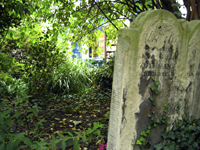 St. Edward’s churchyard (now benchless), in Cambridge
St. Edward’s churchyard (now benchless), in Cambridge
To Hull. For me, there was something to Hull that made it not Leeds or Sheffield or Bristol. Go back another twenty years. 1964 and a more decent starting date to the ‘60s than given by chronology & cultural history. On the first Monday of October, I took a meandering tour through middle England in some mate’s car to the banks of the Humber (“…And the widening river’s slow presence…”). Hull was my first university (of five during that decade) and I lasted three days. Got there on Monday night, registered on Tuesday, went back home Wednesday. (Following Monday I turned up at the London School of Economics and asked could I stay. They said “Yes” and I stayed ’til Christmas. The point of this parenthetical aside being that my abiding memory of LSE was opening the Yearbook, coming across a list of previous students recently deceased & stopping short at JFK’s name.)
Where was I? In Hull in ‘64 and it’s now a Tuesday afternoon in October and we have an hour’s induction by the librarian (“Wow! Fab! Groovy!” as we always allegedly said throughout the decade). If I’d had my wits around me and paid attention to the programme I’d have stayed. The librarian didn’t introduce himself but looked out from the platform at we spotty mass & said: “I feel like Hitler or John Lennon.” I should have been alerted by that but I was already planning an escape route. The librarian was Philip Larkin. I’d bought The Whitsun Weddings that year and never knew this speccy bloke was the library bloke in the place I was headed. I could’ve stayed and sat at his feet!
In the twenty years after that I’d never been near the place. Regretted never having read in Larkin’s library; kept a fond memory; thought I might one day catch a train for the day…“Swerving east, from rich industrial shadows and traffic all night north.” But never went back. Then in that twentieth year it was the place to go. In order to avoid. If you’ve followed so far.
Then I got diverted. I remember driving up the A1 (slow followed by slower in those days) as far as Newark and then took off through Lincoln and had a thought of driving up through the Wolds and over the Humber Bridge that I’d never seen. I got to Nettleton and saw a sign: Potterton & Martin. It rang a bell which tolled ‘Alpine Nursery.’ I turned left. It wasn’t a large affair but it had quality. And those stone troughs beloved of alpine gardeners and which last after you’re dead and take the plants on to next generations. I bought two troughs, plants to fit and enough to overflow onto a scree which I now had plans of creating. I’d already grown a habit of trailing down to Ingwersen’s in Sussex each Spring. Now I had P & M’s for the early Summer. And that’s how it turned out for the next few years before life changed along with habits.
I was reminded of this by a package last week. The annual bulb supply. One of those things I do in Winter—go through the new bulb catalogue, order more bulbs than garden space and allow myself to be surprised in October (“That many? Am I mad?”). Martin died a few years ago but the nursery remains as Potterton’s and still at Nettleton. Until a couple of years ago, when I gave up the car as an unnecessary expense, I drove up each year, carried on over the Humber and stopped for a coffee and a sarnie at the University. Always took a Larkin with me, sat just inside the library and read a few lines. On a fine day I’d drive out of Hull (“…beyond its mortgaged half-built edges…”) towards Spurn Head where “silence stands like heat.” I’d sit on a demolished pill-box and read ‘Here,’ ‘Afternoons’ and ‘Wild Oats’ then drive the long miles back in gathering dusk.
I did that on friend’s birthday. Then came home to the phone ringing. “Hi John. It’s Sarah. Mum’s been trying you all day. When you coming? Bring a bottle.” A few more lines of emotional blackmail later I went. Hated the friends but got blotto.
Autumn’s not only the bulb package. It’s the student-back-in-town time too. Old hands come back and the new ones can’t believe they’ve made it here. And there’s only a week (it might seem) to create an identity; the Emma Thompson-Stephen Fry-Hugh Laurie moment. Stand up, stand out, turn a head, turn heads (even better), find a niche, avoid a clich(é), stay up, stay awake, find a partner, find a foil, be myself, create myself (of course!).
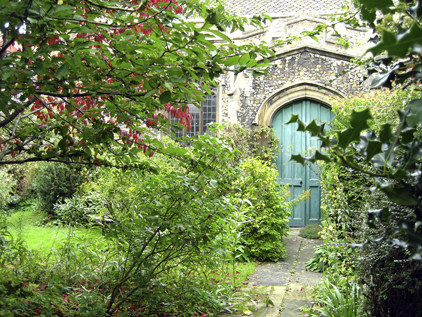
St. Edward’s, Cambridge, England
When I was a student (a state I retained until age twenty-seven; one of my finest feats) the collective student distinguishing feature was a college scarf; without it a bloke looked like his dad and a girl looked like her mum. Until Bowie, everyone in Britain grew up to look like their parents. Now we all look like students. Hence the essential re-definition in the first week of October. In this town, avoiding the obvious and finding the item that stamps difference is good spectacle. Too much difference shouts ‘obvious’; too little makes you look like you’re back in the school you’ve just come from. The best I’ve seen this year (every year) comes from inside; think Ally Sheedy and Judd Nelson in The Breakfast Club. So simple.
One problem in Cambridge is finding a place to sit and watch the dance. We’re over-populated. It’s not just the universities (there are two); it’s the foreign-language schools, the specialist colleges, the sixth-form colleges, the out-of-season tourists, the film crews, the construction crews. And the residents. And the drunks. Cambridge, like…errr…everywhere, has a drink problem and that’s not including the masters of colleges. The town drunks, bless ‘em, get moved on from one neighbourhood to another, bench to bench; hence, lack of benches for people-watching.
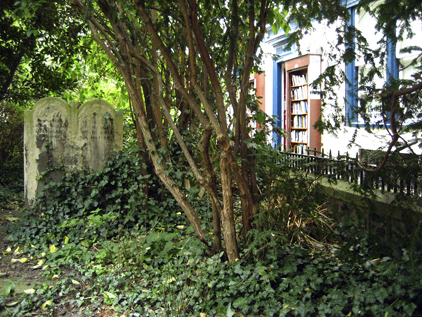
St. Edward’s, Cambridge, England
Last week, a fine week of Indian Summer, feeling stressed from stressing myself, I looked for some old places where I used to quiet-down in town. Next door to Corpus Christi College is St. Botolph’s Church. There’s a narrow lane by its side and a gate into the small, overgrown burial ground. I used to come here when I first arrived in Cambridge in the mid-90s; catching up on a previous decade of non-reading, non-writing, non-reflection. It was a discovered spot; a place you walk past and beyond for an age and then it allows you to discover it. Your own place where you resent company. No chance of that now. Locked. I walked up Trumpington Street to St. Edward’s, squashed between the Arts Theatre and David’s Bookshop, more passed-by than passed-into. I used to bring a Chelsea bun from Fitzbillies here and read Blake. Not any more. Standing room only; the bench in the churchyard gone the way of the drunks it seems.
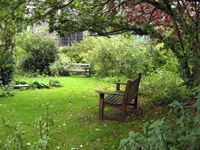 St. Botolph’s Churchyard, Cambridge, England
St. Botolph’s Churchyard, Cambridge, England
And spaces gone. Cambridge isn’t Buenos Aires or Johannesburg and it’s free of favelas but I still notice the closing in of space, the growing out of urban extensions, the accumulation of generic apartment blocks on what used to be someone’s back garden or a community’s vegetable plots, the easy sale of public space with rare payback to public sensibilities or planning gain. I was recently re-reading Jane Jacobs’s The Death and Life of Great American Cities and I know that many people now find it quaint and soooo of its time and so forth, but what it has above its words is its humanity. Lose the spaces and lose the human-ness. People come to this place because of what it was, what it represents, what it did and who did it here. I can still walk past places and feel a quickening of the pulse because I know who walked this lane, slept in that room, betrayed her in that park, sat under that apple tree (allegedly). It’s in the spaces between where I’d still like to reflect on these things. Then go home and let someone else sit down. With Blake. (Dan Brown? The next wagon leaves at noon!)
To Hull.
Culture & Society • Gardening & Landscape • Secular Customs • Permalink
